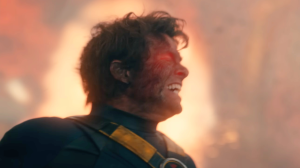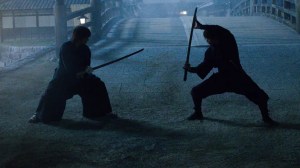What if Hollywood’s Golden Age had brought about racial, sexual, and gender equality in the entertainment industry? It’s a tantalizing thought exercise and the general premise of Ryan Murphy‘s latest Netflix offering, Hollywood. The star-studded limited series takes that idea and runs wild as it traces the journeys of a diverse group of not only young hopefuls but hardened Hollywood veterans, mixes them up with real-life legends, and offers up a slick, shiny fantasy as glittering as any silver screen dream. Unfortunately, despite the superficial beauty and hopefulness of the seven-episode series, Hollywood is more artifice than art.
Videos by ComicBook.com
The series, as is the case with most of Murphy’s projects, is an ensemble affair and that is honestly one of its greatest weaknesses. We’re introduced early on to the “main” figures in the story — David Corenswet’s Jack Castello, who hopes to be Hollywood’s next leading man, Darren Criss’ ambitious director Raymond Ainsley, and Jeremy Pope’s earnest, talented screenwriter Archie Coleman. Despite solid characters with great performances, the series ends up bouncing around in terms of what story it’s trying to tell. Is it Jack’s eagerness to be a star that he becomes a gigolo to make ends meet tale? Is it Raymond’s tale with his desire to break the color barrier as a half-Asian director passing for white to open the door for more Asian talent — specifically Anna May Wong? Or is it Archie’s love story as a gay black man trying to make his name as a writer?
The answer, writ large, is all of them, but the series ends up trying to carry too many threads at once until, ultimately, it’s all text and no subtext. Jack’s story, which is initially presented as familiar but also deeply compelling, ends up largely being window dressing. Raymond’s story never really takes off, and Archie’s story, which does end up having a beautiful arc to it, feels forced, so much so that there are more than a few times in the series that Archie’s lines come across too much as the experiences of a gay black man as imagined by a white man with privilege.
That same near-appropriation factors into the story of Laura Harrier’s Camille Washington and that’s a true weakness of the series. For a story that is, in some respects, about a black actress getting to break the color barrier and take a leading role, Camille is barely a prop in the story.
To put it bluntly, it feels uncomfortably like tokenism too frequently in the series.
That isn’t to say that there aren’t some truly brilliant moments in Hollywood. The episode “Meg” is easily the best of the series and is the episode that does the best by its characters and actors who inhabit them. Patti LuPone’s Avis Amberg, the wife of a studio head who ends up running the show in her own right, is an absolute delight that shows real depth and substance. She may be the most fully-formed character in the series. Jim Parsons’ performance as the infamous real-life Hollywood agent Henry Wilson is campy and at times has some odd shades of his The Big Bang Theory character but is also uncomfortably slimy in the best possible way.
The series is awfully pretty too look at, too, and it’s that superficiality that may be what ultimately leaves Hollywood as flimsy as the celluloid on which movies of the era were made. It’s a show that’s pretty to look at and beautiful to imagine being real, but ties things up too tidily while, at the same time, offering no real depth to any of the stories it seeks to tell. The series falls far short of any provocative message it may have attempted to tell and lands as little more than a slick, shiny, simple-minded escapism.
And that may make it the most Hollywood thing of all.
Rating: 2 out of 5








